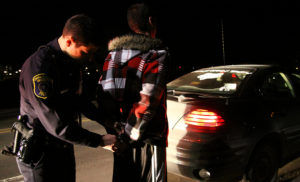
When hearing about another DUI arrest in the news, the focus is often on public safety. “Another danger off the streets.” But thought is rarely ever given to the life of the arrested.
Without getting into a discussion of morals and presumptions of innocence, it’s important to remember that a DUI arrest is not a DUI conviction.
The reality remains that many people jump in their car for a drive not realizing that their final destination for the night will be a jail cell. Whether through failed blood or breathalyzer tests, or simply through a lack of awareness of how many drinks will tip them over that .08 limit, those arrested for DUIs are often thrown off guard. They’re scared, confused, and wondering: “What’s going to happen next?”
In the unfortunate event that you ever find yourself in this situation, here is a general idea of what’s going to happen to you. Of course, every situation is different, but this hypothetical situation will remain as straightforward as possible. Your life will change after a DUI arrest, but it’s important to remember that an arrest is not a conviction — this is not the end!
Arrest
Assuming you follow the officer’s instructions, you’ve blown into the portable breath test and the number flashes “.10.” The officer gets stern: “You’re coming with us.” What happens next?
After riding in the back of the patrol car (your own car will be towed, at your expense, to a lock up), you will be brought into the precinct. This is where they will “book you,” as in take your mugshot and record your fingerprints for their files. They will also look into your criminal background history to see if you have any previous arrests or records.
In the case of a DUI arrest, they will also take your blood, urine, or breath test, and will send it off to a crime lab to get a more thorough analysis. These will be the formal testing results used against you in court.
It’s important to remember that in the state of Arizona, refusing a breath or blood test can cost you your driver’s license for an entire year. That loss will not be worth it, and officers will likely be able to obtain a search warrant to draw your blood. Instead, know your rights so you can make an informed decision.
Next you’ll be placed in a cell while they finalize your booking. Eventually, you will be allowed to make phone calls for an attorney if you make that request, a bail bonds company if you need it, or a ride if the police will release you from custody.
Once they’ve had the time to write up all of your paperwork, including your ticket, they will give that to you as well. It will have some important information on it, including your mandatory court date and court location. Another common form is the Admin Per Se/Implied Consent document that is submitted to the Motor Vehicle Department. Typically, if you were arrested for DUI and submitted to breath or blood testing, your driver’s license will be suspended for no less than 90 days, beginning a short time after your arrest. If this is the case, an attorney can help dispute that penalty, but you should set up a reliable form of transportation as an alternative.
Post-Arrest and Jail
Once you’ve made it out of jail, you’ll be required to appear in court to handle your charges–either by pleading guilty or fighting the allegations. If you hire an attorney, he or she may be able to appear for you at court. If you’re concerned about the cost of hiring a criminal attorney, consider the potential costs of pleading guilty. Your attorney will investigate the factual and legal grounds for your case and will know how to best approach these charges.
After meeting with your attorney and discussing your options and the next steps, you’ll have to wait–potentially through a few court dates so that your attorney can fully investigate your case. Prior to that date, you may have a suspended license due to Motor Vehicle Division consequences. You will not be able to drive to work, school, or even to the grocery store down the street. With the help of a good attorney, these consequences can be disputed.
What happens next down the road? That is dependent on where you decide to take it.
If you plead guilty, there will be large fines, jail time, and possibly a new suspension of your driver’s license. You will likely also have to substance abuse classes and install an ignition interlock device in your car.
If you plead not guilty and take your case to trial, you’ll have to appear in court and potentially reserve a few days for the process while the prosecutor and defense attorney provide evidence to the jury. Plea deals could also be brought to the table if your attorney articulates the shortcomings of your case. You may also be able to get evidence thrown out due to a faulty investigation or improper science with the help of your attorney.
You can’t undo the trauma of the initial arrest and confinement, but you can take control of your future.




